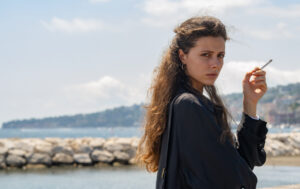Piranhas (La Paranza dei Bambini) press conference with Claudio Giovannesi, Roberto Saviano and Francesco Di Napoli
The large ensemble cast of Claudio Giovannesi’s Piranhas (La Paranza dei Bambini) sprawled into the audience at the press conference for the competition film. Many of the boys were street-casted in Naples and their tenacity of spirit sparkled in the room. The teenagers have aspirations not necessarily as actors but as chefs and barbers, professions that lie outside the temptation of the gang culture which the movie addresses.
Put simply, Piranhas is a coming-of-age story. More complexly, it investigates the temptations of crime in our society and the transformation of a juvenile group of friends into a gang. It evokes the cyclical nature of violence and the slippery slope down which a desire for money and power can lead. However, writer Roberto Saviano was clear that although the film is about a specific district in the centre of Naples, with its local history and culture, the location is not so important, as they are “narrating a global story”. Director Giovannesi added, “the film is set in Naples as it has a working-class population. We had these references in mind when we breathed life into the film.” In spite of this, he was clear that the film is “about adolescence, not about sociology. What we wanted to talk about was adolescence and a certain type of crime.”
It became clear that the southern Italian city was a conduit through which the writer and director could explore a global epidemic. Saviano affirmed, “Naples is full of facets and contradictions. The film is trying to talk about the world through talking about Naples, rather than vice-versa. There is a high level of school dropouts. It’s one of the highest figures in the western world. People want to have money and get their hands on power. They often use the pistol as a shortcut to use these things. We wanted to talk not just about the city but about our current world.”
The micro-story is used evoke a macro issue. Saviano discussed his book, on which the film is based: “It was inspired by a true story. “La Paranza” refers to groups of young boys who fill a power vacuum. You see these boys who are at the head of a criminal group. They’ve always been involved but never in charge. That’s what led me to work on this. We drew inspiration from these stories.”
The film’s star, Francesco Di Napoli, acknowledged that “it was helpful knowing these areas well. We grew up in the middle of this kind of context. That was an advantage for us.”
The conference took a deeper plunge into the current political climate in Italy. Saviano is one of many Italian journalists whose protection is to be removed. He commented, “We need to understand what’s happening right now in Italy. It’s very serious. It’s also been removed for another journalist. I was involved in trying to get the protection reinstated. The political situation is enormously serious. Having bodyguards is not a privilege. Europe is no longer a safe space for people who write – that is a real change from the past. As far as I am concerned, I am perfectly at peace; I will continue to write and tell these stories and won’t be intimidated by threats”.
The panel was asked if they are afraid their film may be seen as an inspiration for young people. The director explained the reality that he didn’t think this feature was supposed to be educational. Giovannesi explained that when he makes a movie he is trying to show the humanity of characters through empathy. He feels there is a political value to that and focuses on the realities that are actually concealed. In his opinion, they embarked on unveiling innocence in the face of ferocious violence.
The final moments of the press conference were used to try and figure out what the solution to this problem is, what it is that people need and if there is a magic wand to fix the situation. The resounding answer from the three young actors on the stage was that it is up to the individual to rise out of their own fate with a dream of something better. This was met by a clarifying thought from Saviano, who saw the change in thinking of young people today. A generation before, he believed the answer to the solution from young people would be in institutional politics. However, today “the idea of referring to the world of politics has completely vanished. 20 years ago somebody would have said ‘politics should’ or ‘somebody should’… Now, nobody has any hope that that could actually happen.”
Mary-Catherine Harvey
Photo: NurPhoto/ Getty Images
Piranhas (La Paranza dei Bambini) does not have a UK release date yet. Read our review here.
Read more reviews from our Berlin Film Festival 2019 coverage here.
For further information about the event visit the Berlin Film Festival website here.
Watch a clip from Piranhas (La Paranza dei Bambini) here:
https://www.youtube.com/watch?v=QEZ3zHsQNiQ

























Facebook
Twitter
Instagram
YouTube
RSS